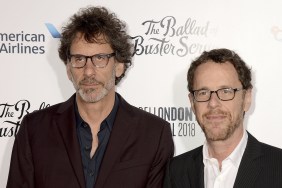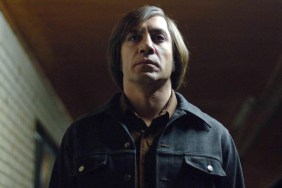Cast:
Tommy Lee Jones as Ed Tom Bell
Javier Bardem as Anton Chigurh
Josh Brolin as Llewelyn Moss
Woody Harrelson as Carson Wells
Kelly Macdonald as Carla Jean Moss
Garret Dillahunt as Wendell
Tess Harper as Loretta Bell
Barry Corbin as Ellis
Stephen Root as Man who hires Wells
Rodger Boyce as El Paso Sheriff
Beth Grant as Agnes (Carla Jean’s Mom)
Ana Reeder as Poolside Woman
Kit Gwin as Molly (Sheriff Bell’s Secretary)
Zach Hopkins as Strangled Deputy
Chip Love as Man in Ford
Directed by Joel and Ethan Coen
Summary:
This is a terrific return to form on a par with “Fargo” and other Coen classics, and it’s the type of movie that can only get better over time with repeat viewings.
Story:
Llewelyn Moss (Josh Brolin) is a Texan who comes across a drug deal gone wrong in the middle of the desert, but when he takes a suitcase filled with $2 million cash, he goes on the run to stay ahead from a ruthless killer named Anton Chigurh (Javier Bardem) and a bunch of Mexicans, while a local sherriff (Tommy Lee Jones) follows the trail of dead bodies left by Chigurh and tries to figure out who is responsible.
Analysis:
Except for a short segment in the recent anthology “Paris je t’aime,” The Coen Brothers have been out of action since 2004’s failed remake of “The Ladykillers,” but their return with this stark thriller based on Cormac McCarthy’s novel should more than appease the fans who’ve been waiting for their return to greatness.
Josh Brolin is Llewelyn Moss, a rugged Marlboro Man who comes across a scene of carnage in the desert while out hunting. This drug deal gone wrong leaves a case filled with 2 million dollars and no one alive to claim it, but when Moss returns to the scene of the crime after taking the money, he’s chased by the Mexicans there to do damage control and recover the money. Realizing his life is in danger, Llewellyn sends his wife Carla Jean (Kelly MacDonald) into hiding as he goes on the run from the hired killer they send after him.
We first meet Javier Bardem’s Anton Chigurh, an oddly calm Mexican with an oddly out-of-place Prince Valiant haircut, in the very first scene of the movie in which an unwitting police officer tries to bring him in, only to meet a grisly fate. We don’t know much about him, except that he’s been assigned to get that case of money back, something he does using a primitive tracking device hidden in the case and an air tank with a hose and a retractable bolt usually used to kill unhealthy livestock, but which he uses to knock out door locks.
Most of the film’s 2-hour running time is comprised of Moss being chased by Chigurh, every once in a while cutting back to Tommy Lee Jones as the local sheriff, who is mystified by the expanding body count all seemingly done by the same man who killed his officer. All three men are extremely resourceful, making the film that much more fascinating to watch them deal with various situations as they come up. One might try to argue which of the three key players is the focal point of the story, but Bardem’s clinically ruthless yet always smiling killer will leave the biggest impact, a movie baddie on par with Hannibal Lecter or Dennis Hopper’s Frank Booth in “Blue Velvet.” It takes almost an hour before we even learn his name or his reasons for acting the way he does, but much is revealed by a late player in the game played by Woody Harrelson, whose relationship with Anton is never quite clear. The most important information he shares comes when he points out bemusedly how Llewelyn is still alive despite having seen Chigurh, a rare occurrence.
The script is impeccable, easily some of the Coen brothers’ best writing, presumably taking McCarthy’s best bits and injecting their own flair for character dialogue. While far more serious in tone than some of the Coens’ other movies, they maintain their inimitable way at getting us to laugh at very dark and violent moments and at the odd menagerie of Southern characters who cross the path of our three leads. The best lines and monologues are given to Bardem and Tommy Lee Jones, the latter who proves to be a natural as a Coen Brothers character.
Fans of McCarthy’s novel might be surprised and delighted by how closely the Coens stick to the tone and plot of McCarthy’s novel, even if the film’s third act falters as key characters meet an inexplicable fate that’s likely to have many viewers scratching their head. With the timing of most of the events in the movie being equally obtuse, the Coens constantly keep us guessing what’s going to happen next, which adds to the film’s effectiveness as a suspense-filled crime-thriller of the highest order. Surprisingly, Kelly MacDonald, with a heavy Southern accent replacing her equally dense Scottish one, is far more integral to the story than one might expect at first, and in one particular sequence with Bardem, we see some of her best work.
Every bit of our attention is kept rapt to this visually stunning film by the perfectly-constructed shots of the Coens’ regular director of photography Roger Deakins (who also shot “The Assassination of Jesse James”), and the American wilderness along the Mexican border plays as important character as the Mid-West did in “Fargo.” Adding to the minimalist tone of the piece is the lack of any incidental music or score whatsoever, not one single note until Carter Burwell’s credit shows up at the end with some timely music that magically appears to accompany the end credit roll.
Still, one can’t help but marvel over the skillful way the Coen Brothers have crafted this adaptation of McCarthy’s work, likely to be considered amongst their classics for many years to come.










